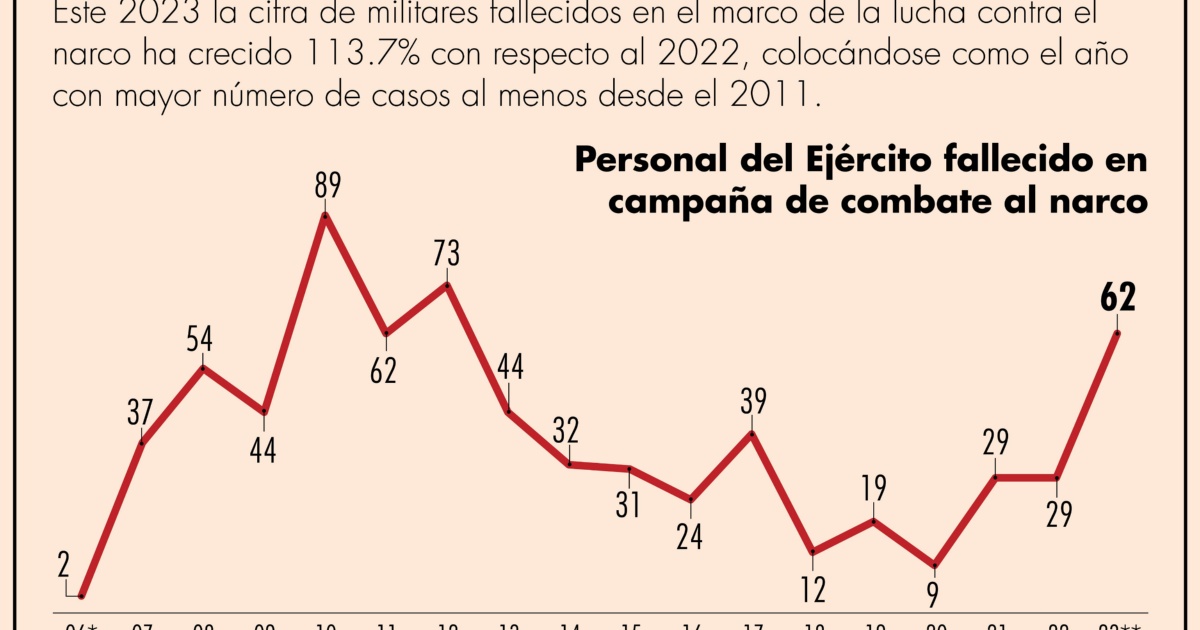A member of the Mexican army was killed and two others were injured on Saturday night in the road in the municipality of Tenejapa, Chiapas, as a result of an ambush by members of organized crime, Sedena said.
The Secretariat of National Defense (Sedena) explained that the attack took place in the towns of Loma Bonita and Guadalupe Miramar, near the border with Guatemala, where the military was carrying out reconnaissance work.
Information from local media indicates that the military may have been involved in the search for the mayor and municipal secretary of Maravilla Tejenapa, Zoel López Gutiérrez and Aciano Roblero Velázquez, who have been reported missing since last Friday.
As a result of the ambush, Corporal Hermenegildo Hidalgo suffered a gunshot wound to the right side of the chest below the collarbone, which caused his death.
While the other two wounded members were identified as an infantry lieutenant with the surname Guzmán, who received a bullet hit in the left hand, and an infantry corporal with the surname Peralta, wounded in the right thigh.
Dozens of victims in a six-year period
From December 2018 to November of this year, at least 149 members of the military have died while enforcing the ongoing campaign against drug trafficking and the federal Firearms and Explosives Act under the current federal administration.
Official figures indicate that 55% of these deaths were caused by firearm attacks, while the rest died from other causes such as car or plane crashes, drowning and run-overs.
There have been 62 murders this year alone, compared to 29 deaths in 2022, an increase of 113.7 percent.
On this topic, Javier Oliva Posadas, an academic and researcher from UNAM and experts on security and crime issues, concluded that the main risk for the military has become the availability of powerful weapons on the drug market originating in the United States. Mexico as part of its fight against organized crime.
“While criminals use prohibited weapons, the Mexican military must obey the legal framework established by international law and must use conventional weapons and confront the real killers. So there is a very striking disproportion in the capabilities that the Mexican state has, through federal forces, to confront criminals,” he said.
In this sense, the political scientist believed that the recent confiscation of weapons, which showed how the number of weapons with greater lethality is increasing, “is something really alarming, because it means two things: one, that the authorities of the United States are not fulfilling their role to limit trafficking with weapons… and on the other hand, it also shows greater action, greater operations by the military and the National Guard against organized crime,” he emphasized.
However, he emphasized that one of the main problems in the case is that there have been no serious approaches to public security from the civilian side, that is, from the states, so the National Guard plays a vital role.
Unspecified, time of armed forces in the states
Due to a lack of information in this regard from the governors, the Bicameral Commission on the Evaluation and Monitoring of Permanent Assignments of the Armed Forces in Public Safety Tasks was unable to determine which are the federal entities of the country where the participation of elements is no longer required. army in these tasks.
A plural working group composed of senators and federal deputies has therefore set a deadline of 60 days, which is counted from the moment when the Congress of the Union approves – in the case of the Senate this week – the first semester. – the annual report on the use of standing armed forces in public security tasks, submitted last May by the head of the federal executive to receive the corresponding reports.
“In relation to the analysis of the state of public security institutions in the country and considering that there is no information duly provided by the heads of government of the federal entities that allow this commission to assess the state of public force in the federal entities and municipalities, although we recognize the efforts, coordination and joint work between by the security cabinet of the federal government, federal entities and municipalities, this bicameral commission points out that there are insufficient conditions for assessing federal entities where the permanent presence of standing armed forces is no longer necessary for public security tasks, since the decision to withdraw standing armed forces involves a detailed and multidimensional analysis the specific situation of each subject.” , quotes the approved opinion. bicameral commission.
(With information from Rolando Ramos)
maritza.perez@eleconomista.mx

